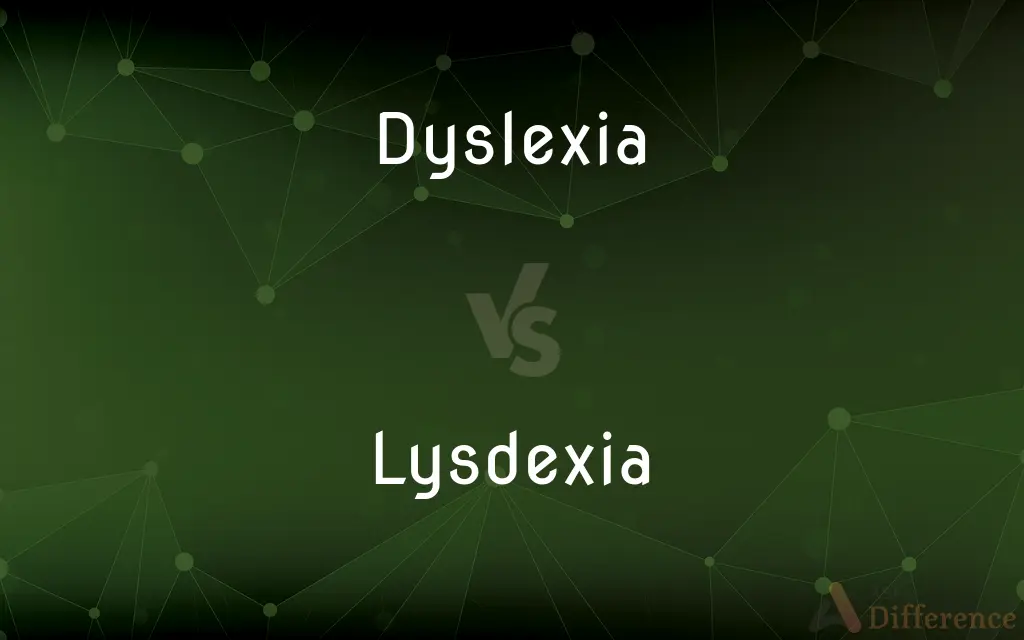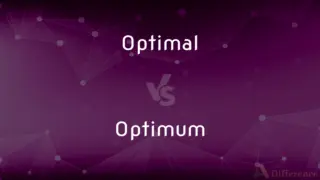Dyslexia vs. Lysdexia — What's the Difference?
By Urooj Arif & Fiza Rafique — Updated on April 24, 2024
Dyslexia is a specific learning disorder characterized by difficulties with reading, while lysdexia is often humorously used to refer to dyslexia, emphasizing the jumbling of letters.

Difference Between Dyslexia and Lysdexia
Table of Contents
ADVERTISEMENT
Key Differences
Dyslexia is recognized as a neurological condition that affects reading abilities, impairing a person's capacity to interpret words and letters correctly. On the other hand, lysdexia does not actually exist as a medical or psychological condition; it is a playful rearrangement of the letters in "dyslexia," used to mimic the symptoms of dyslexia itself.
Individuals with dyslexia often experience challenges with word recognition, spelling, and decoding abilities. Whereas, lysdexia, as a term, is typically used in casual or humorous contexts to describe or mimic these reading struggles without representing a real condition.
Dyslexia can have significant educational and social impacts on individuals, necessitating specialized educational strategies and interventions. Conversely, lysdexia, being a whimsical term, holds no such implications and is often used to lighten the discussion around the reading disorder.
Diagnosis of dyslexia requires a thorough evaluation by educational psychologists or specialists, focusing on cognitive and reading assessments. In contrast, lysdexia, as a made-up term, requires no diagnosis and is often brought up only in informal conversations or jokes.
Treatments for dyslexia include tailored reading interventions, educational adjustments, and sometimes speech therapy, reflecting its seriousness and impact on learning. On the other hand, lysdexia is not treated as it is not a recognized disorder, but rather a playful nod to the challenges faced by those with dyslexia.
ADVERTISEMENT
Comparison Chart
Definition
A learning disorder marked by difficulties in reading and decoding words.
A humorous anagram of 'dyslexia,' not a real condition.
Origin
Medical and psychological research.
Informal, often used in humorous contexts.
Diagnosis
Requires professional assessment.
No diagnostic criteria; not a real condition.
Treatment
Involves educational strategies, therapies.
No treatment required.
Impact on Learning
Can significantly affect academic and life skills.
Used to jest about dyslexia, no real impact.
Compare with Definitions
Dyslexia
Often involves problems with spelling and writing.
Dyslexia can lead to frequent spelling errors despite regular practice.
Lysdexia
Reflects a lighthearted approach to discussing dyslexia.
Using lysdexia in conversation can make talking about dyslexia less daunting.
Dyslexia
A condition affecting the ability to read and interpret words.
Children with dyslexia may reverse letters like 'b' and 'd' while reading.
Lysdexia
Used to humorously mimic dyslexia symptoms.
Lysdexia isn't a problem; it's just a funny way to describe letter jumbles.
Dyslexia
Characterized by difficulties with phonological processing.
Dyslexia makes it hard for some to associate sounds with symbols.
Lysdexia
A playful inversion of the letters in 'dyslexia.'
He joked about his 'lysdexia' when he mixed up the letters of a word.
Dyslexia
Usually diagnosed in childhood.
Early diagnosis of dyslexia can improve outcomes through timely intervention.
Lysdexia
Not a recognized medical term.
Although often mentioned, lysdexia is not found in medical textbooks.
Dyslexia
Can be managed with appropriate educational strategies.
Schools often provide reading specialists to help students with dyslexia.
Lysdexia
Carries no implications for treatment or diagnosis.
Mentioning lysdexia at a doctor's office would likely elicit a chuckle rather than concern.
Dyslexia
Dyslexia, also known as reading disorder, is characterized by trouble with reading despite normal intelligence. Different people are affected to different degrees.
Lysdexia
(humorous) Dyslexia; proneness to metathesis in reading, writing, or speech due to (real or imagined) dyslexia.
Dyslexia
A learning disability marked by impairment of the ability to recognize and comprehend written words.
Dyslexia
A learning disability characterized by reading and writing difficulties.
Dyslexia
An impaired ability to read.
Dyslexia
Impaired ability to learn to read
Common Curiosities
How is dyslexia diagnosed?
Dyslexia is diagnosed through a series of tests conducted by educational psychologists or other specialized professionals.
Is lysdexia a real medical condition?
No, lysdexia is not a real condition; it is a humorous rearrangement of the letters in "dyslexia."
What are common treatments for dyslexia?
Treatments include specialized reading instruction, educational accommodations, and sometimes speech therapy.
Does lysdexia have any educational implications?
Lysdexia, being a non-existent condition, has no educational implications or needs.
What is dyslexia?
Dyslexia is a learning disorder characterized by difficulties in reading, writing, spelling, and sometimes speaking.
Are there tools to help manage dyslexia?
Yes, there are various tools and software designed to assist those with dyslexia in reading and writing.
Is there a genetic component to dyslexia?
Yes, dyslexia can have a genetic component, often running in families.
How does dyslexia affect daily life?
Dyslexia can impact various aspects of daily life, including academic performance, job duties, and social interactions.
How common is dyslexia?
Dyslexia affects approximately 10-15% of the population to varying degrees.
Can dyslexia be cured?
Dyslexia cannot be cured, but it can be effectively managed with educational interventions and support.
Who coined the term lysdexia?
The origin of the term lysdexia is not clearly documented, but it is commonly used in humorous contexts.
What can be done to support someone with dyslexia?
Supporting someone with dyslexia involves understanding their needs, providing appropriate educational resources, and fostering a supportive environment.
What should one avoid saying to a person with dyslexia?
Avoid dismissive or judgmental comments like "just try harder" or "you're not really trying," as they can be demoralizing.
Can adults be diagnosed with dyslexia?
Yes, adults can be diagnosed with dyslexia, even if they were not diagnosed as children.
What is the main challenge of dyslexia?
The main challenge is the difficulty with accurate and/or fluent word recognition and poor spelling and decoding abilities.
Share Your Discovery

Previous Comparison
Esthetic vs. Aesthetic
Next Comparison
Optimal vs. OptimumAuthor Spotlight
Written by
Urooj ArifUrooj is a skilled content writer at Ask Difference, known for her exceptional ability to simplify complex topics into engaging and informative content. With a passion for research and a flair for clear, concise writing, she consistently delivers articles that resonate with our diverse audience.
Co-written by
Fiza RafiqueFiza Rafique is a skilled content writer at AskDifference.com, where she meticulously refines and enhances written pieces. Drawing from her vast editorial expertise, Fiza ensures clarity, accuracy, and precision in every article. Passionate about language, she continually seeks to elevate the quality of content for readers worldwide.












































